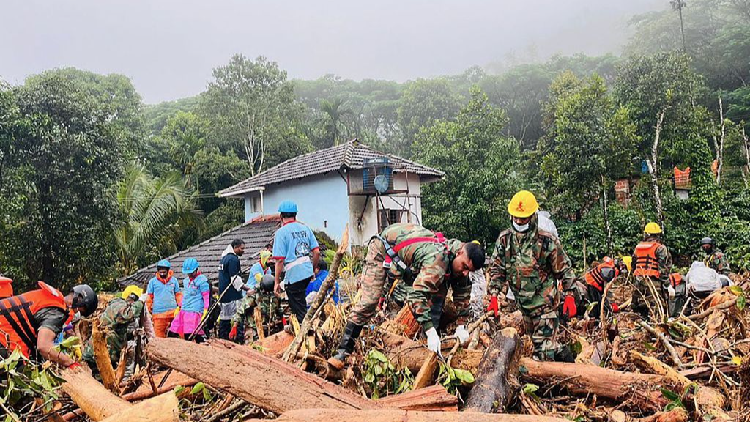Research Indicates Climate Change Intensified Precipitation Causing Landslides in India
A rapid analysis conducted by climate scientists revealed on Tuesday that the heavy rains in southern India last month, which led to landslides and resulted in hundreds of fatalities, were exacerbated by human-caused climate change.

The study, conducted by World Weather Attribution—a collective of scientists employing established climate models to assess the influence of human-driven climate change on extreme weather events—found that the rainfall amounting to 15 centimeters over a 24-hour span from July 29 to 30 was intensified by 10 percent due to global warming. Moreover, the group anticipates that ongoing emissions of greenhouse gases will result in even more frequent and severe downpours, which can trigger disasters like landslides.
In Kerala State, a popular tourist location, nearly 200 fatalities were reported, with rescue teams still searching for over 130 individuals who are missing.
"The Wayanad landslides are another catastrophic example of climate change playing out in real time," said Mariam Zachariah, a climate scientist from Imperial College of London and co-author of the rapid study.
Last month’s rainfall marked the third-highest recorded in Kerala State since the Indian weather agency began monitoring in 1901.
In 2022, heavy precipitation resulted in over 400 deaths in Himachal Pradesh, a state in the Indian Himalayas. Multiple studies have indicated that climate change has caused India’s monsoon rains to become more erratic. "Until the world replaces fossil fuels with renewable energy, monsoon downpours will continue to intensify, bringing landslides, floods and misery to India," Zachariah added.
Kerala, in southern India, has been particularly susceptible to extreme weather influenced by climate change. In 2018, severe flooding affected large areas, leading to at least 500 deaths. Furthermore, a cyclonic storm in 2017 resulted in at least 250 fatalities, including fishermen caught at sea.
"Millions of people are sweltering in deadly heat in the summer. Meanwhile, in monsoons, heavier downpours are fueling floods and landslides, like we saw in Wayanad," noted Arpita Mondal, a climate scientist at the Indian Institute of Technology Bombay and co-author of the study. Earlier this year, a different analysis by the same team discovered that lethal heat waves in India, which claimed at least 100 lives, were made at least 45 times more probable due to global warming.
As the most populous nation globally, India is among the highest current emitters of greenhouse gases and is regarded as one of the most vulnerable regions to climate change's effects.
"When it rains now, it rains heavily. In a warmer world, these extreme events will be more frequent and we cannot stop them. However, we can try to establish early warning systems for landslides and also avoid any construction activity in landslide-prone regions," stated Madhavan Rajeevan, a retired senior official from India's Ministry of Earth Sciences who hails from Kerala State.
The study released Tuesday also emphasized the importance of reducing deforestation and quarrying, while enhancing early warning and evacuation systems to protect people from future landslides and floods. It highlighted that the Wayanad region experienced a 62 percent decline in forest cover, which may have exacerbated the risks of landslides during heavy rains.
"Even heavier downpours are expected as the climate warms, which underscores the urgency to prepare for similar landslides in northern Kerala," said Maja Vahlberg, a climate risk consultant at the Red Cross Red Crescent Climate Centre and another co-author of the study.
(Cover: Relief personnel conduct a search and rescue operation after the landslides in Wayanad District, Kerala State, India, August 1, 2024. /AFP)
James del Carmen contributed to this report for TROIB News
Discover more Science and Technology news updates in TROIB Sci-Tech












